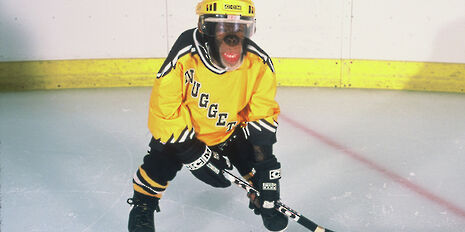Unknown Displeasures: MVP: Most Valuable Primate
“Teach a Chimp how to skate? Like that’s gonna happen!” – Allanah Lewis identifies classic cinematic influences in this forgotten treasure from the turn of the century.

Jack the Chimp isn’t like other children. For one thing, he’s a genius who lives and works at the University of San Pueblo, California, and, for another, he is not human. Indeed, Jack the Chimp is a three-year old chimpanzee who defies the old proverb that, though you can lead a horse to water, you can’t teach a monkey how to skate.
When funding for the speech and language development department at the University is cut and Jack’s professor dies, the head of science declares his intentions to sell the poor thing to a lab in Tennessee instead of the idyllic “El Simian” reserve for geriatric monkeys. Thanks to a kindly yet misguided janitor, Jack escapes and is put on a train out of town. But the train is run by Southern Rail and Jack incurs many delays and inadvertently ends up in British Columbia.
"At times the whole piece can feel like something of a pastiche of the great works of 20th century cinema."
Meanwhile, the Westover family (comprising little Tara, big brother Steven, World’s Best DadⓇ and Apathetic Mom) are trying to make a new life for themselves north of the border after the disaster of the Trump administration. Whilst Tara struggles to make friends at school due to her profound deafness, her brother incurs troubles of his own when joining the local ice-hockey B-team. He is a “Yankee boy” and, naturally, his teammates are quick to reject him and his late-stage capitalist ideals.
Yes, Steven certainly has his work cut out for him among this rag-tag bunch of losers known as the ‘Nuggets’, until he and Tara find Jack wandering about in the woods by their house and teach him to skate in a training montage consisting of the same shot played ten times at different angles. Turns out Jack is good. Damn good. He’s fast on the ice, like a homing salmon or the fast lane at Sainsbury’s, and, with a little help from Steven and the Nuggets, redefines kiddy-league ice-hockey for all of Canada.
Though well-meaning, I feel Robert Vince fails to find his own directorial voice. The film’s influences from cult-classics are evident: E.T., Planet of the Apes, Citizen Kane, Good Will Hunting (the bit where Matt Damon is almost sold to a laboratory for hepatitis testing) to name but a few. At times the whole piece can feel like something of a pastiche of the great works of 20th century cinema.
In spite of its whimsical and family-friendly façade, the film is clearly a stab at post-truth performance art, one which disassembles the political narrative of the West post-9/11: Jack is a standard-bearer for the displaced, disillusioned and mass-appropriated American voters; the impromptu objectification of a woman on the street by the entire junior hockey team is clearly a remark on the 'jock culture' pervading our universities and colleges; and the presentation of Steven and Tara’s parents addresses the blind privilege of the baby boomer generation. That said, the film is not afraid to ask the big questions: How many times can the ‘Apes are our closest relative- like your mum’ joke be reused? Why have the parents in this film not been put on trial for gross negligence?
There were a few stand-out performances, and credit has to go to Bernie, Mac and Louie as Jack; Dolores Drake and Christine Willes as Ladies #1 and #2; and the Hockey Puck, as himself. The rest of the cast played their parts forgettably, though there is an endearing scene in which Steven, upon first being introduced to the Nuggets, asks aloud, “What have I gotten myself into?” that vividly reminded me of my first term at Cambridge.
All in all, MVP: Most Valuable Primate is something of a Van Gogh: resplendent, but the world simply isn’t ready for it yet. Look out for the much-anticipated sequel, MVP 2: Most Vertical Primate. “Teach a Chimp how to climb? Like that’s gonna happen!”
 News / Cambridge academics stand out in King’s 2026 Honours List2 January 2026
News / Cambridge academics stand out in King’s 2026 Honours List2 January 2026 Interviews / You don’t need to peak at Cambridge, says Robin Harding31 December 2025
Interviews / You don’t need to peak at Cambridge, says Robin Harding31 December 2025 Comment / What happened to men at Cambridge?31 December 2025
Comment / What happened to men at Cambridge?31 December 2025 Features / “It’s a momentary expression of rage”: reforming democracy from Cambridge4 January 2026
Features / “It’s a momentary expression of rage”: reforming democracy from Cambridge4 January 2026 News / Varsity’s biggest stories of 202531 December 2025
News / Varsity’s biggest stories of 202531 December 2025









